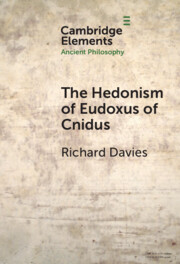Refine search
Actions for selected content:
3 results

The Hedonism of Eudoxus of Cnidus
-
- Published online:
- 27 November 2023
- Print publication:
- 21 December 2023
-
- Element
- Export citation
6 - Anachronism in the Renaissance historiography of mathematics
-
-
- Book:
- Anachronisms in the History of Mathematics
- Published online:
- 19 July 2021
- Print publication:
- 22 July 2021, pp 167-195
-
- Chapter
- Export citation
The Measure of Pleasure: A Note on the Protagoras
-
- Journal:
- Journal of the American Philosophical Association / Volume 3 / Issue 3 / Fall 2017
- Published online by Cambridge University Press:
- 08 February 2018, pp. 301-315
-
- Article
- Export citation
